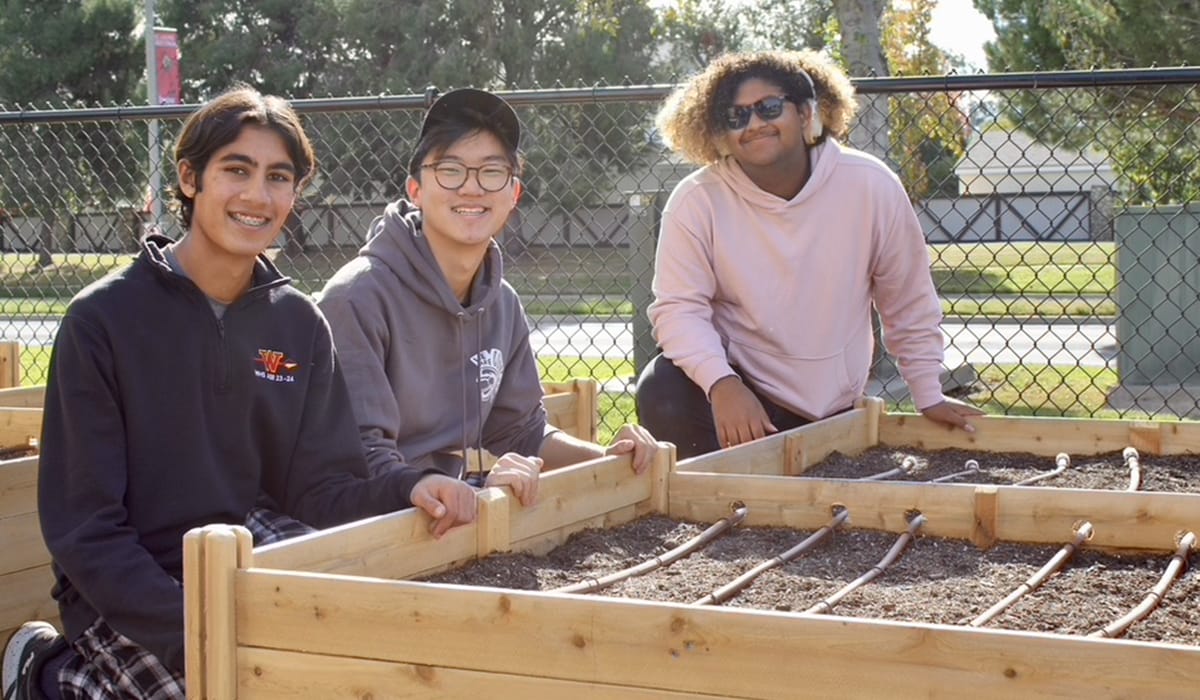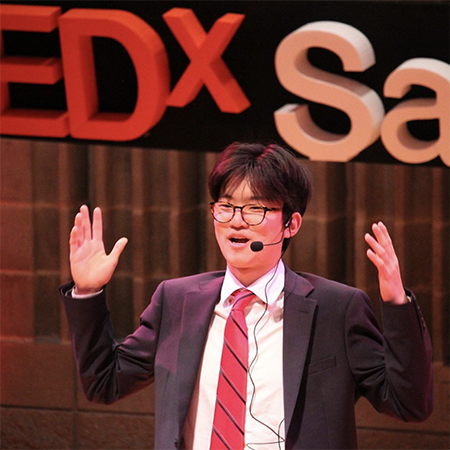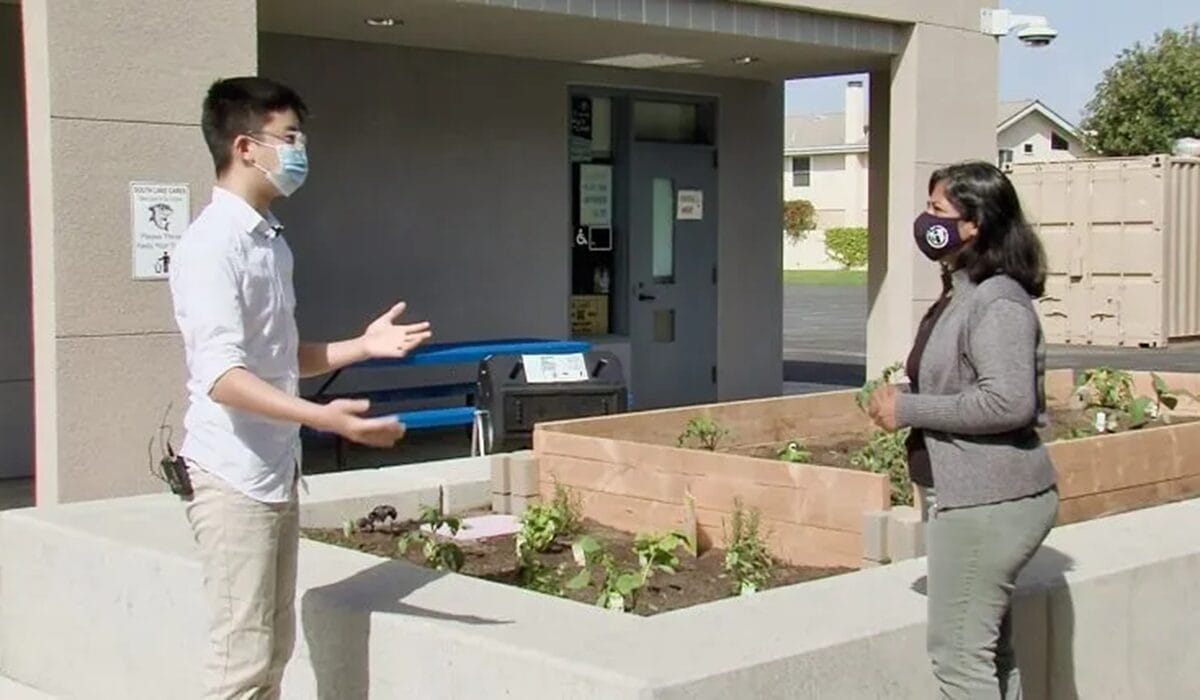High School Junior Uses Environmental Education to Fight Back Against the Climate Crisis

Meet Daily Point of Light Award honoree Matthew Chang. Read his story, and nominate an outstanding volunteer or family as a Daily Point of Light.
When Matthew Chang was in 7th grade, he emailed his city councilmember. Leading with passionate concern about the environment, he quickly caught the attention of the person on the receiving end.
“He was interested in starting a community garden at his middle school and wanted to see if there were any resources or help,” Farrah Khan, now mayor of Irvine recalls. “So, I responded. And from there, he’s just been doing one thing after another, and it’s been very impressive.”
With the encouragement of an enthusiastic response, Matthew went to City Hall to pitch his idea supported by academic research on the benefits of such projects. His hard work paid off, and it led to both resources and a valued mentor relationship that continues to this day.
Matthew comes from a second-generation Korean-American family of five. His grandfather, a man who learned to grow vegetables during his childhood in rural South Korea, taught him to garden, and he and his mom keep a small plot in their backyard.
“It was really him who inspired me to begin all of this. Although he isn’t with us anymore, I try to continue his legacy in a lot of the things that I do with Climate Garden,” Matthew says.
Climate Garden is an organization Matthew founded as an 8th grader in 2021. He formed a team of student leaders with neighboring K-12 schools to focus on sustainability, eradicating food insecurity and environmental education. The harrowing experience of being sent home from school due to wildfires and poor air quality moved him to take action.
“I really felt an almost implacable urge to contribute to the cause. I couldn’t let my future burn without trying everything I could,” he emphasizes.
“So, I used my platform as my school’s student body president, and I began doing what I could to achieve realistic reform.”
The initial middle school garden quickly expanded to 12 gardens across Orange County that have produced more than 11,000 pounds of fresh fruit, vegetables and herbs. While most of it goes to a local food bank to help fight food insecurity, some goes to the school cafeteria to be enjoyed by the student body.

“They’re coming up with new trends and new ways of doing things that are really going to be beneficial for us in the long run,” Mayor Khan says of the young constituents who have taken on active roles in setting up the community for the future.
Recently, Matthew has added a composting program at his high school in response to SB 1383, a state Senate bill that was passed to regulate food waste in the public school system. So far, it has transformed 4,000 pounds of food waste into nutrient-rich soil for the school garden.
“The compost helps nurture the plants in our garden, which then creates food that can be eaten at the school cafeteria,” he explains. “It’s a sustainable, self-fulfilling cycle.”
Education is key to Matthew’s mission to empower his peers to help tackle the climate crisis. Teaming up with Assemblywoman Cottie Petrie-Norris of District 73, he has worked towards passing a resolution in the California Assembly that will recognize California Youth Climate Action Day and provide schools and local organizations with resources and curriculum needed to make environmental education across the state more robust.
With Climate Garden, Matthew also leads weekly workshops based at one of the gardens along with educational summer camps to enable young people to create projects of their own. Last year, one virtual climate camp saw around 1,600 students from 212 schools.
“What I really love about the programs that we’ve been doing is they not only inform students about systemic issues in the world but also provide them with a platform for developing as leaders and expressing themselves,” he says.
Afterwards, they awarded 23 Future of Sustainability grants to students initiating such projects. It’s an opportunity Matthew particularly enjoys, because it ensures that students from all backgrounds can have equitable access to resources. He holds weekly virtual meetings to offer help and guidance for anyone undertaking a new venture.
“He’s just had the great ability to bring people together. What he’s done with the youth community is incredible,” Mayor Khan gloats. “He shares his passion, and that ignites the fire and in so many others.”
Currently, nearly 270 middle and high school volunteers across the country and international schools are actively involved in either maintaining school garden sites or virtual summer camp lessons. The comradery built through working towards a common goal and the opportunities created make Matthew’s mentor proud.
“We want every one of our community members to be involved, but especially our youth, because they’re the ones that are coming up with these new ideas and haven’t had the opportunity before to get engaged with local government,” Khan stresses.
Matthew finds motivation in the excitement volunteers experience seeing their flowers sprout for the first time and when they learn something new. The latter is a more common occurrence after he delved into the world of podcasting over the pandemic. The Sustainable Future promotes environmental advocacy and serves as a resource for climate literacy. Through a lot of self-professed trial and error, it has grown to a listenership of around 700 people each month on Spotify and Apple Podcasts and is entirely produced and edited by him and his team.
“We have a really great lineup of interviewees this season ranging from politics, to business, food, science and more,” he says, having recently started hosting season three. “It’s been a great way to elevate student voices and give them a platform to share their opinions with the world.”

This June, the Climate Garden team is organizing an international youth climate summit with guest speakers from all areas of environmental stewardship. Matthew hopes this and the establishment of gardens at four additional schools by the end of the year will help expand Climate Garden’s reach and inspire more people to join the cause. His volunteer work is a meaningful part of his daily life, and he encourages others to get involved wherever they are.
“Just get started. Find a cause that is important to your local community, something that’s important to you, and just contribute as much as you can to it,” he suggests. “Connecting yourself with any cause is a great way to be grateful, to think less about yourself and contribute more towards the community that has shaped you.”
Matthew cherishes the time he has spent building up Climate Garden and making a tangible difference in the lives of his friends, neighbors and community members.
“Solving the big problems of today is something we can’t do alone. So, it’s important to listen to others, especially those who have differing opinions from us and make bridges of connection to rally a community towards change and progress,” he notes, emphasizing listening in leadership.
Having led Climate Garden for four years now, this may be the most important lesson yet. Because with the climate at stake, everyone’s future hangs in the balance, and everyone is vital to the solution. Teamwork can change the world.
Do you want to make a difference in your community like Matthew? Find local volunteer opportunities.
